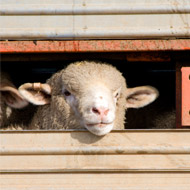
Movement restrictions in place at affected premises
Farmers are being urged to remain vigilant for bluetongue virus (bTV) after the disease was confirmed in four sheep imported from France.
The virus was identified by the APHA and The Pirbright Institute during routine post-import testing when the sheep were brought to Lancashire. To prevent further spread of the disease, the affected animals have been humanely culled.
“This detection is another example of our robust disease surveillance procedures in action but must highlight to farmers the risks that come with bringing animals from disease-affected areas into their herds,” said chief veterinary officer for the UK, Christine Middlemiss.
“It is also a clear reminder for farmers that the disease remains a threat, despite coming towards the end of the season when midges are active. Farmers must remain vigilant and report any suspicions to APHA.
“They should also work with importers to make sure effective vaccination needs are complied with and that all animals are sourced responsibly.”
The discovery comes three weeks after two imported cows tested positive for bTV in Yorkshire. Defra reported that the disease had been picked up in cattle imported from France and that they were isolated and humanely slaughtered as a result.
Bluetongue affects cattle, goats, sheep and other camelids such as llamas. The virus is transmitted by midge bites and can reduce milk yield and cause infertility. In the most severe cases, bluetongue is fatal for infected animals.
Movement restrictions are in place at the affected premises and there are strict rules on the movement of livestock. Sheep farmers are being urged to discuss their needs with a veterinary surgeon and to practise good biosecurity on their premises.



 The Veterinary Medicines Directorate (VMD) is inviting applications from veterinary students to attend a one-week extramural studies (EMS) placement in July 2026.
The Veterinary Medicines Directorate (VMD) is inviting applications from veterinary students to attend a one-week extramural studies (EMS) placement in July 2026.